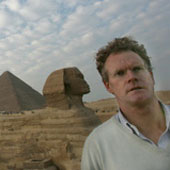Talking About Jihad
What does “jihad” mean to Muslims in the Middle East?
May 5, 2009
Most Muslims will tell you that "jihad" is the Arabic word for struggle, and that the jihad demanded by their religion is actually the lifelong struggle to make yourself a better person as well as to augment Islam's place in the world.
They argue that using the word interchangeably with "holy war" constitutes a Western attempt to exaggerate and sensationalize their faith by depicting it as brimming with blood lust.
Semantically, they are right — jihad does indeed mean a struggle.
But those who argue that the word contains no implication of violence are glossing over the fact that for some zealots, jihad means only one thing: an armed fight against the enemies of Islam that they believe they are destined to carry out in perpetuity.
Hence, fatwa smack-downs over "justifiable" jihad rage back and forth relentlessly, particularly on the free-for-all format of the Internet.
Evidently Al-Qaeda has captured much of the attention by actually trying to implement this vision of jihad, but it is hardly the only voice out there. These arguments within Islam generally fail to attract sufficient attention in the West.
A key challenge in trying to shape and define Islam has always been its lack of a central authority. Even when there was a caliph, or commander of the faithful, his ability to dictate religious laws was limited by the basic Islamic understanding that nothing should stand between any Muslim and the Koran, the word of God.
(Never mind that the caliph was often just a figurehead co-opted by absolute rulers wielding the real power.) Hence there is no one authority to settle an argument.
The general tone and the public perception of the jihad debate is one key to change, to diminishing the level of violence so devastating to the Middle East. It was easy for Arab Muslims to support the concept of jihad when it was in distant lands like Afghanistan, Bosnia or Chechnya.
But the militants who committed repeated atrocities in the Middle East — in Amman or Riyadh or Casablanca — found a distinctly less welcoming public. The best prospect for quelling the level of violence is to ensure that people understand the cost it levies on innocent lives. Authoritative voices must demand that it stop. Thus far that message has been left ambiguous in the Islamic world.
There are Muslim thinkers who call for a complete overhaul of the way the holy texts are interpreted as the best means to eliminate any question that the faith does not condone terrorism, much of it carried out in the name of Islam.
Such arguments started with the advent of modernism in the late 19th century, but have taken on renewed urgency now that so many Islamists are trying to manipulate the concept of jihad to fit their own political aims.
The jihad question is debated throughout the region, but perhaps nowhere as vehemently as in Saudi Arabia. The kingdom is arguably the most important country on this issue given that the Wahhabi ideology there has spawned some of the most intolerant teachings on how Muslims should view the rest of the world. Three of the four main branches of Sunni Islam reject the idea of an offensive jihad, of Muslims initiating hostilities.
The one Sunni school that endorses offensive jihad is the Hanbali school, of which the Wahhabi sect dominant in Saudi Arabia is the main offshoot. "For them, to defend the religion and to glorify it you have to attack your enemy first," Abdel Rahem al-Lahem, a Saudi lawyer and former militant, told me.
"That is why it was only when attacks started here in the kingdom that the Wahhabi religious scholars finally began to make the distinction between an offensive and a defensive jihad. They spoke against offensive jihad after those attacks."
The chain of suicide bombings targeting mostly civilians that burst forth starting in May 2003 in Riyadh sparked a debate within the kingdom over the degree to which that Wahhabi intolerance inspired terrorism. The religious establishment utterly rejected the idea that any discussion was warranted and quickly moved to squelch it.
The royal family, dependent on the powerful clerical network for their claim that they ruled as defenders of the faith, caved in to the pressure, smothering the discussion in the press after about three weeks. But the arguments raged on anyway.
The creaking princes running the country retreated into their favorite denial — claiming that any violence carried out in the name of Islam was foreign to the kingdom. If Saudis were implicated in any attacks, they must have been influenced by misguided Muslims abroad — Egyptians, for instance.
This dubious argument became quite the stretch when Saudis were blowing up Saudis in the very heart of the capital, but the most senior royals kept it up anyway.
Editor’s Note: This is the second part in a three-part series from Neil MacFarquhar’s book, “The Media Relations Department of Hizbollah Wishes You a Happy Birthday.” Copyright 2009 Neil MacFarquhar. Reprinted with permission of PublicAffairs Press.
Read Part I here.
Takeaways
There are Muslim thinkers who call for a complete overhaul of the way the holy texts are interpreted as the best means to eliminate any question that the faith does not condone terrorism.
A key challenge in trying to shape and define Islam has always been its lack of a central authority.
"Jihad" is the Arabic word for struggle, and the jihad demanded by Islam is actually the lifelong struggle to make yourself a better person, as well as to augment Islam's place in the world.
For some zealots, jihad means only one thing: An armed fight against the enemies of Islam that they believe they are destined to carry out in perpetuity.
Read previous
Expatriates in the Middle East
May 4, 2009
